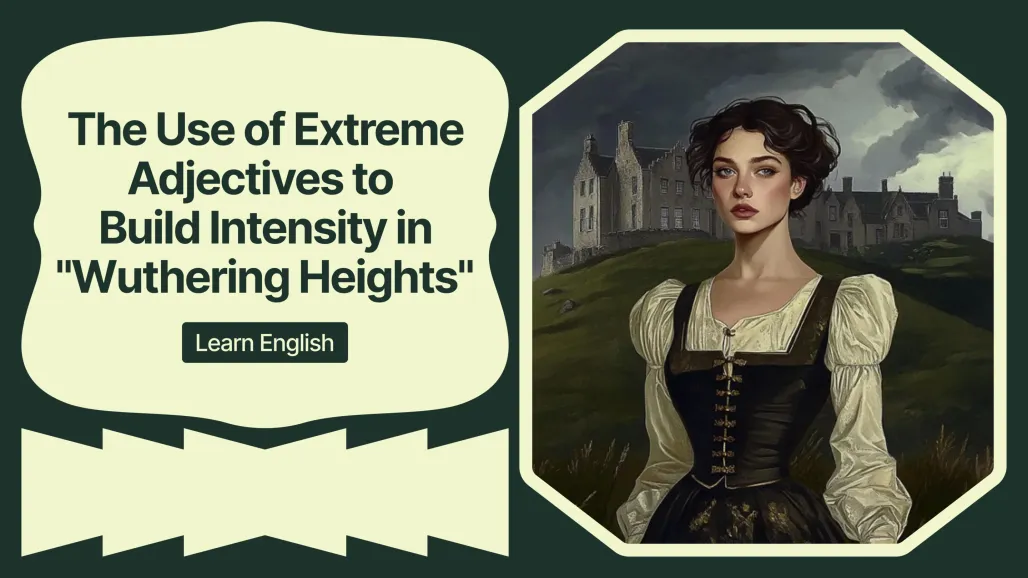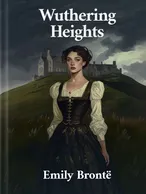The Use of Extreme Adjectives to Build Intensity in Wuthering Heights

Explore how Extreme adjectives in Wuthering Heights heighten intensity, convey deep emotions, and create a vivid, immersive atmosphere.
What Are Extreme Adjectives?
Examples of Extreme Adjectives in Wuthering Heights
Vile
Desolate
Furious
Immense
Appalling
Ghastly
Terrible
Dreadful
Unutterable
Awful
Infernal
Exquisite
Frightful
Excessive
Insufferable
What Are Extreme Adjectives?
Extreme adjectives are words that intensify the quality they describe to a very high degree, often conveying emotions or characteristics in a vivid and powerful way. Unlike regular adjectives, which offer more neutral or moderate descriptions, extreme adjectives convey heightened intensity. For instance, instead of saying someone is very angry, the extreme adjective furious may be used. Similarly, tiny replaces very small, and enormous replaces very big. These words carry an added sense of emphasis, making them highly effective for bringing descriptions to life.
When using extreme adjectives, it's important to avoid standard intensifiers like very, quite, or fairly. Extreme adjectives already convey the highest possible degree of a quality, so pairing them with such words can sound awkward or redundant. Instead, they work best with strong intensifiers like absolutely, utterly, completely, or totally to match their intensity.
For example, instead of saying very furious, quite furious, or fairly furious, which would be incorrect, you should use phrases like:
- absolutely furious
- utterly exhausted
- completely terrified
- totally delighted
How Extreme Adjectives Are Used in Literature
In literature, extreme adjectives help pull readers into the story by expressing emotions, settings, and character traits in a more intense way. Instead of just describing, they amplify the scene. For example, in the phrase “the desolate moors”, the word desolate does more than suggest emptiness; it conveys a strong feeling of isolation and abandonment, deepening the mood of the scene.
The Importance of Extreme Adjectives
Extreme adjectives make language more expressive. For English learners, understanding these adjectives is useful for clear and powerful communication. Extreme adjectives let speakers and writers express emotions and experiences with more impact, enriching both spoken and written language.
Emily Brontë’s Wuthering Heights is a great example of how extreme adjectives can enhance storytelling. The novel uses these adjectives to add depth to its dark, passionate themes.
Examples of Extreme Adjectives in Wuthering Heights

Vile
- Non-Extreme Synonym: unpleasant, bad

Desolate
- Non-Extreme Synonym: lonely, empty

Furious
- Non-Extreme Synonym: angry

Immense
- Non-Extreme Synonym: large, great

Appalling
- Non-Extreme Synonym: shocking, disturbing

Ghastly
- Non-Extreme Synonym: awful, dreadful

Terrible
- Non-Extreme Synonym: bad, frightening

Dreadful
- Non-Extreme Synonym: bad, shocking

Unutterable
- Non-Extreme Synonym: indescribable, unspeakable

Awful
- Non-Extreme Synonym: bad, unpleasant

Infernal
- Non-Extreme Synonym: terrible, annoying

Exquisite
- Non-Extreme Synonym: great, intense

Frightful
- Non-Extreme Synonym: bad, scary

Excessive
- Non-Extreme Synonym: too much

Insufferable
- Non-Extreme Synonym: unbearable

Why Extreme Adjectives Matter
Using extreme adjectives not only adds depth to Wuthering Heights but also elevates the language, making it more sophisticated and expressive. Brontë’s choice of words like “vile,” “immense,” and “dreadful” instead of simpler terms enhances the emotional resonance and dramatic intensity of her characters and settings, allowing readers to feel the full weight of the novel’s atmosphere.
For English learners, studying these adjectives offers a dual benefit: they expand vocabulary for expressing strong emotions and vivid imagery, and they also allow speakers and writers to sound more refined and articulate. Learning extreme adjectives and their non-extreme synonyms helps readers appreciate Brontë’s language and apply similar techniques, enriching their own communication with greater impact and elegance.
